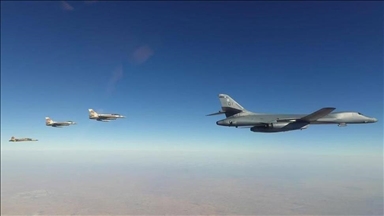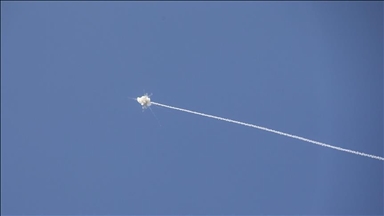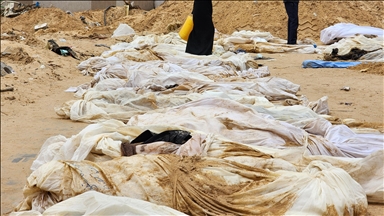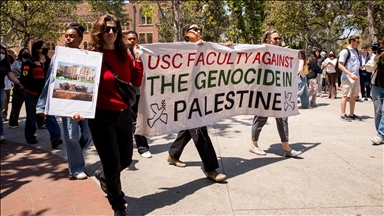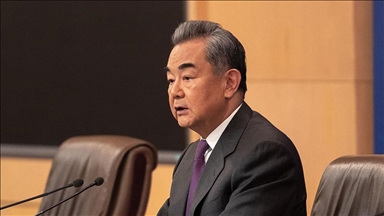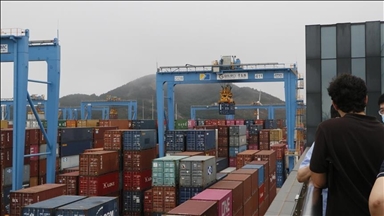Timeline: US-Iran tension since collapse of nuke deal
Escalation of tension between Washington, Tehran begins with US president scraping Iran nuclear deal in May 2018
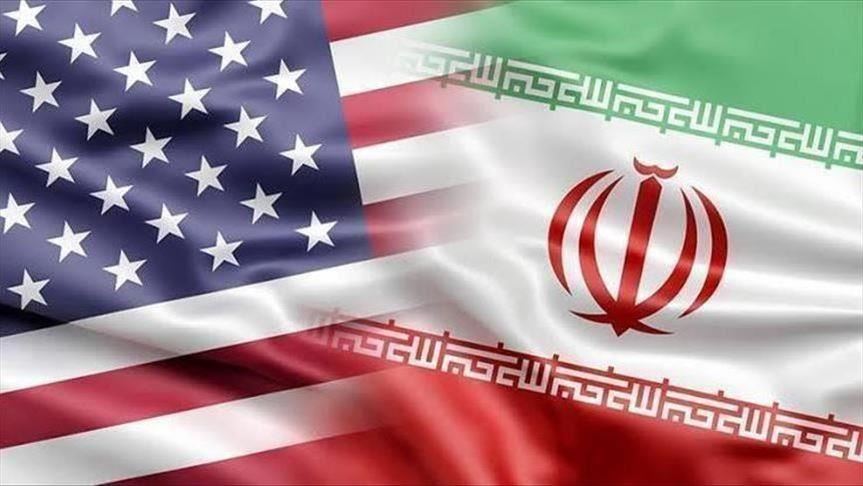
ANKARA
May 8 2018: U.S. President Donald Trump formally announces U.S. withdrawal from nuclear deal with Iran, formally known as Joint Comprehensive Plan of Action (JCPOA).
"A horrible one-sided deal that should have never, ever been made," he said about the agreement.
"It didn't bring calm, it didn't bring peace, and it never will," he added.
May 9, 2018: Iranian Supreme Leader Ali Khamenei describes President Trump's speech on nuclear agreement as "inane and superficial".
"In the name of the Iranian people, you are making a mistake, Mr. Trump," Khamenei said.
May 12, 2018: U.S. condemns Iran's "destabilizing influence" in Middle East, pointing to Tehran's support for rebels in Yemen, attacks against Israel.
White House spokeswoman Sarah Sanders says Iran's Islamic Revolutionary Guards Corps fired rockets at Israeli citizens, Iran's proxies in Yemen launched ballistic missile at Saudi capital Riyadh.
May 21, 2018: U.S. announces 12 demands from Iran, including discontinuation of its nuclear program and withdrawal from Syrian war.
Trump administration warns of severe economic sanctions if Iran rejects demands.
Aug. 7, 2018: U.S. moves to impose first wave of pre-nuclear deal sanctions on Iran, largely targeting country's banking sector.
Nov. 5, 2018: Trump administration announces implementation of new sanctions covering Iran's energy, shipbuilding, shipping, financial sectors.
April, 8 2019: Washington designates IRGC as "foreign terrorist organization".
In response, Iranian Supreme National Security Council formally designates U.S. Central Command (CENTCOM) as "terrorist organization".
April 22, 2019: U.S. announces end of waivers for sanctions on countries importing oil from Iran.
Secretary of State Mike Pompeo says decision taken as part of Washington's "maximum pressure" campaign on Tehran to force countries to cease oil purchases from Iran.
April 22, 2019: Iran renews threats to close Strait of Hormuz if prevented from using strategic Persian Gulf waterway to export oil.
"If there is any threat […] to Iranian waters, we will not hesitate to respond," says Ali Reza Tengseiri, commander of Iran's Revolutionary Guard Corps naval force.
May 5, 2019: U.S. deploys aircraft carrier strike group, bomber task force to CENTCOM in Middle East to send "clear and unmistakable message" to Iran, says Presidential National Security Adviser John Bolton.
May 6, 2019: Acting U.S. defense chief Patrick Shanahan warns Iran against any "provocation" or threats to American forces after Washington's deployment of naval strike group to the region.
May 8, 2019: President Trump imposes new sanctions on Iran's iron, steel, aluminum, copper sectors as tensions between rivals escalate.
May 8, 2019: Iran's President Hassan Rouhani threatens resumption of high level enrichment of uranium if Iranian interests in nuclear deal with world powers not protected within 60 days.
May 8, 2019: Iran's Foreign Minister Javad Zarif says some officials in U.S. administration want war with Iran, saying this would be suicide
May 9, 2019: President Donald Trump says Tehran acting in threatening manner toward U.S., adds he was open to meeting Iranian counterpart.
"We have information that you don't want to know about, they were very threatening," says Trump.
May 10, 2019: U.S. announces Pentagon's deployment of Patriot anti-missile batteries in Middle East to deter Iranian threats.
May 12, 2019: Washington blames Iran, proxies for four tanker bombings in United Arab Emirates, attack on pipeline in Saudi Arabia.
May 24, 2019: President Trump announces plans to deploy 1,500 additional troops to Middle East amid heightened tensions between Tehran, Washington.
May 24, 2019: "These actions are also a threat to global peace and stability," says Iran's Foreign Minister Mohammad Javad Zarif.
May 29, 2019: Iranian President Rouhani says: "The door of negotiations is not closed provided the U.S. lifts the sanctions and fulfills its commitments."
June 13, 2019: U.S. blames Iran for attack on two oil tankers in Gulf of Oman, releases video evidence.
June 13, 2019: Iran denies accusations, says supposed U.S. intelligence footage false.
June 17, 2019: U.S. sends 1,000 additional troops to Middle East for "defensive purposes", says acting Defense Secretary Patrick Shanahan.
President Trump does not want war with Iran, says Secretary of State Mike Pompeo.
June 20, 2019: Iran's Islamic Revolutionary Guard Corps announces downing of U.S. surveillance drone.
President Trump says "Iran made a big mistake" with drone downing.
June 20, 2019: Iranian President Rouhani describes U.S. sanctions on Iran as "economic terrorism", "crime against humanity".
June 24, 2019: President Trump imposes sanctions on Iranian Supreme Leader Ayatollah Ali Khamenei and office.
Iran says U.S. sanctions on Khamenei shut "doors of diplomacy" between Tehran, Washington.
President Trump denies need to receive congressional approval for Iran strike.
June 25, 2019: Iranian military capable of shooting down any U.S. spy drone, says Navy Commander Rear Admiral Hossein Khanzadi.
Trump says any Iranian attacks against U.S. targets will be met with "great and overwhelming force".
June 25, 2019: U.S. reportedly carries out cyberattack against Iranian proxy group.
Alleged attack aims to target network communications of Iran-backed Iraqi militant group Kata'ib Hezbollah.
Sept. 7, 2019: Iran announces decision to enrich uranium over 20% JCPOA limit as part of third step to drop nuclear deal commitments in response to U.S. sanctions.
Sept. 23, 2019: Iranian President Rouhani rejects U.S. counterpart's call for new nuclear deal until easing or lifting of economic sanctions.
Nov. 5, 2019: Iran announces initiation of fourth step to cease nuclear agreement commitments.
President Rouhani says Iran's moves to scale down commitments are reversible if other signatory countries fully abide by their commitments.
Dec. 13, 2019: Iran's proxies carry out series of attacks on bases where U.S. forces are deployed alongside Iraqi troops, says Secretary of State Mike Pompeo.
"We must also use this opportunity to remind Iran’s leaders that any attacks by them, or their proxies of any identity, that harm Americans, our allies, or our interests will be answered with a decisive U.S. response," says Pompeo.
Dec. 27, 2019: U.S. civilian contractor killed in rocket attack on Iraqi military base.
Dec. 29, 2019: U.S. forces hit five Kata'ib Hezbollah positions in Iraq, Syria in response to death of U.S. national in rocket attacks on Iraqi base hosting coalition forces fighting Daesh/ISIS terror group.
Pentagon says attacks were "defensive strikes" against Iran-linked Kata'ib Hezbollah militia group.
U.S. forces kill 25 militants from Iran-linked group.
Dec. 31, 2019: Iraqi protesters protesting Washington's attacks on Iranian-backed group storm U.S. Embassy in Baghdad.
President Trump accuses Iran of "orchestrating an attack" against U.S. embassy in Iraq amid ongoing protests outside building.
Jan. 1, 2020: President Trump threatens Iran "will be held fully responsible for lives lost, or damage incurred" at U.S. facilities. "They will pay a very BIG PRICE! This is not a Warning, it is a Threat," he says.
Jan. 3, 2020: U.S. conducts drone strike near Baghdad International Airport killing Qasem Soleimani, commander of Iranian Revolutionary Guards' Quds Forces and Abu Mahdi al-Muhandis, vice president of Hashd al-Shaabi group.
"At the direction of the President, the U.S. military has taken decisive defensive action to protect U.S. personnel abroad," Pentagon says in a statement on killing of Soleimani.
"What the United States did yesterday should have been done long ago," says President Trump.
U.S. urges American citizens to immediately leave Iraq.
"The regime of the United States will be responsible for all the consequences of this criminal adventurism," Iran's Supreme National Security Council says in statement.
Jan. 5, 2020: President Trump threatens to hit Iranian targets in response to any retaliatory attacks on U.S. citizens, assets.
"Iran has been nothing but problems for many years. Let this serve as a WARNING that if Iran strikes any Americans, or American assets, we have targeted 52 Iranian sites (representing the 52 American hostages taken by Iran many years ago), some at a very high level & important to Iran & the Iranian culture, and those targets, and Iran itself, WILL BE HIT VERY FAST AND VERY HARD. The USA wants no more threats!" President Trump says on Twitter in response to threats from Iran.
Jan. 8, 2020: Iran's Revolutionary Guards Corps fires "tens of missiles" at Iraq's Ain al-Assad airbase jointly operated by U.S., Iraqi forces.
"In Operation Martyr Soleimani in the early hours of Wednesday, tens of ground-to-ground missiles were fired at the U.S. base and successfully pounded Ain al-Asad Base," the Revolutionary Guards say in official statement.
Trump says on Twitter: "All is well! Missiles launched from Iran at two military bases located in Iraq. Assessment of casualties & damages taking place now. So far, so good! We have the most powerful and well equipped military anywhere in the world, by far!"
Foreign Minister Javad Zarif says on Twitter: "Iran took & concluded proportionate measures in self-defense under Article 51 of UN Charter targeting base from which cowardly armed attack against our citizens & senior officials were launched."
Anadolu Agency website contains only a portion of the news stories offered to subscribers in the AA News Broadcasting System (HAS), and in summarized form. Please contact us for subscription options.


